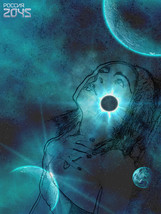/ Фото конкурс
/ experts
- Ph.D. philosopher and psychologist, editor-in-chief of Historical Psychology and Sociology magazine, and a professor at Moscow State University
 Akop Pogosovich
Akop Pogosovich
Nazaretyan“The intelligence of modern man is an artificial intelligence . . .”
- Correspondent member of RAS, professor of the Moscow State University, head of the laboratory “Psychology of communications and psychosemantics” (MSU)
 Viktor F.
Viktor F.
Petrenko"I think that as a working hypothesis, it is possible that forms of contacts with highly advanced civilizations are possible as a result of this profound meditation..."
- President of the Center for Cellular and Biomedical Technologies, First Moscow Medical University and expert on the conscious management of health, biotherapy and the prevention of aging
 Dmitry A.
Dmitry A.
SHAMENKOV‘The body gradually becomes artificial; new tissues replace existing ones, and new media, somehow extending the limits of our body, are being invented. Of course, man and technology are being knitted together. Step by step, we are moving towards the formation of a cybernetic organism...’
- Ph.D. in Biology, Head of the Lipid Metabolism Laboratory at the Russian Institute of Gerontological Research and Development
 Elena V.
Elena V.
TERIOSHINA‘There is nothing to be afraid of. The project of creating a carrier of an immortal brain is of extreme importance. Nature definitely creates talented, brilliant, genius people – but they are mortal. Mankind creates books and imparts knowledge to descendants. But imagine a genius working eternally!’
- Researcher, fiction and alternate history theorist. Is a literary critic and political essayist, sociologist, socionics specialist and military historian
 Sergey
Sergey
Pereslegin"Project 2045 also requires enormous engineering support. And I would claim that both for Russia and for the entire world, the only possibility of overcoming the phase barrier is not to solve biological tasks, not biotechnology, but to solve the task for maintaining engineering for the critical period of 20 years".
- Researcher, science debater, futurist, transhumanist, and author
 Anders
Anders
Sandberg"... I certainly think that practical benefits of being able to live for ever, if I transmit myself digitally, I will be able to run on bodies which are not biological or enhanced biological and be able to backup copies in case, if something goes wrong, would be enormous. So, I think, that in the future I am hoping to be software..."
- Doctor of physics and mathematics, Head of the Department of Neuroinformatics at the Center for Optical Neural Technologies of the Scientific Research Institute for System Analysis of the Russian Academy of Sciences
 Witali L.
Witali L.
Dunin-Barkowski' If the job is to be taken seriously, we can get a detailed model of a brain prototype within five years or so. And since many research areas concerned with the subject develop in parallel, it may well be that we can achieve these results even faster...'
- Artist, art theorist, Curator of the National Center of Contemporary Arts (Kaliningrad branch)
 Dmitry H.
Dmitry H.
BULATOV‘In the near future, hybrid combinations of living and nonliving elements will help to recover lost or missing original features. And of course, greatly enhance them in comparison to the usual ones...’
- Ph.D. in Technical Sciences
 Professor Aleksandr A.
Professor Aleksandr A.
BOLONKIN‘An artificial mechanical body will have great power and withstand extreme environmental conditions: high temperature, pressure, radiation, space...’
- Ph.D. in Physical and Mathematical Sciences, Senior Researcher of the V.I.Il`ichev Pacific Oceanological Institute (Russian Academy of Sciences), composer, philosopher
 Viktor Yurievich
Viktor Yurievich
Argonov“I think that before initiating a radical cyborgization of the brain, you have to find the neural correlate of consciousness. Does it have a physical or purely informational nature in the form of neurosignals? Is there a group of neurons that is directly responsible for consciousness? Or perhaps consciousness is produced by still smaller elements within neurons. . . .”
- Ph.D. in Biology, Head of the Neurophysiology and Neural Interfaces Lab at the Russian State University Biology Department (MGU)
 Professor Alexander Y.
Professor Alexander Y.
KAPLAN‘By the time sustaining a brain artificially becomes possible, bio-robots will have been perfected to the point of looking like a decent human body...’
- Chairman of the organizing committee of the political party “Evolution 2045”, founder of the movement “Russia 2045”, president of the congress GF2045
 Dmitry
Dmitry
ItskovDo you remember The Surrogates movie? It perfectly demonstrates the abilities of a mind-controlled artificial human body, or an avatar. It is what our project is all about. The Surrogates’ screenwriters were not consistent enough (probably due to the lack of imagination) in the evolution of their ideas. There is no doubt that the mankind needs an avatar.
- Professor at the University of Southern Maine, co-chairman of GF2045
 Barry
Barry
Rodrigue"While innovation is often presented as a technological process, it also needs to be applied everywhere and to everything. We need innovation in human affairs, from family relations to business affairs. Innovation has to address both ecological balance of species and destruction of inorganic habitats. Alternatives must be found for warfare and the arms industry. In short, innovation is a process that applies to all existence..."






 LinkedIn
LinkedIn
 LiveJournal
LiveJournal
 Google
Google
 Twitter
Twitter
 Facebook
Facebook
 Я.ру
Я.ру
 ВКонтакте
ВКонтакте
 Mail.ru
Mail.ru